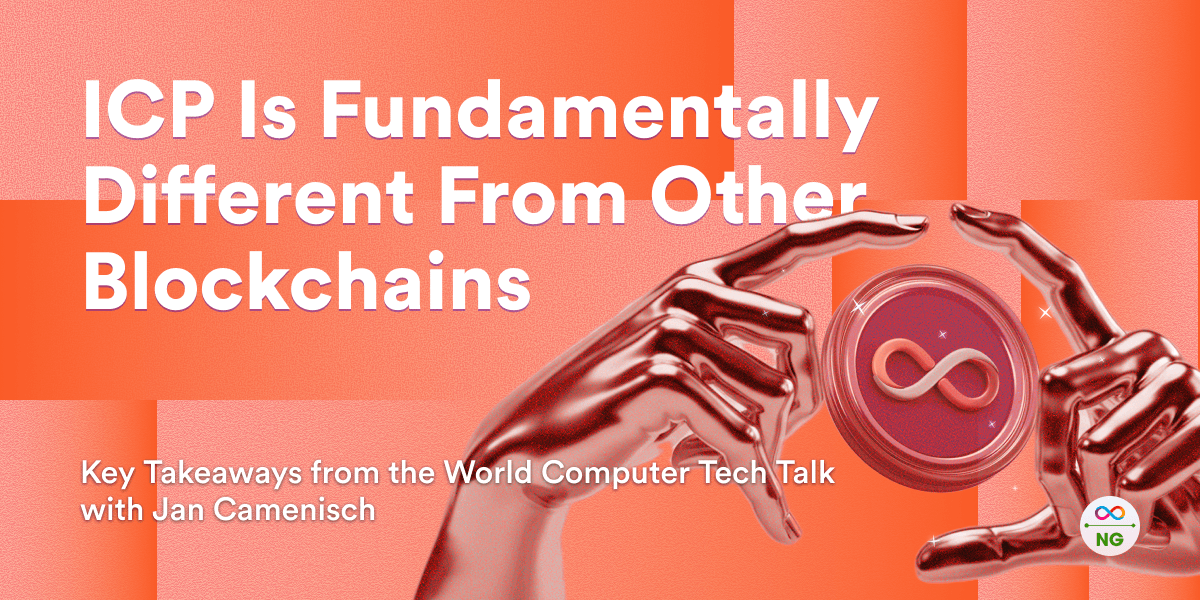
The Internet Computer Protocol (ICP) is often misunderstood as just another blockchain project. In reality, ICP is a revolutionary decentralized protocol designed to serve as the world’s first web-speed, internet-native blockchain network, capable of hosting everything from enterprise IT systems to social media, DeFi, and AI applications entirely on-chain.
Behind this transformative vision is the DFINITY Foundation, a team of leading cryptographers, distributed systems engineers, and protocol researchers. With over 1,000 person-years of R&D, DFINITY has reimagined how blockchains can power the future of software infrastructure, beyond what’s been possible with legacy chains.
In a recent episode of the World Computer Tech Talks on YouTube, Jan Camenisch, CTO at DFINITY and a globally recognised cryptography expert, broke down what truly sets ICP apart from other blockchain networks. Here's a deep dive into his insights and the game-changing capabilities of the Internet Computer.
A Protocol Designed to Replace the Traditional IT Stack
Unlike many chains focused solely on financial applications, ICP was built to replace the traditional IT stack. As Jan explained, its mission is to address the skyrocketing cost of cloud computing and the cybersecurity risks of centralized infrastructure.
ICP achieves this by running as a distributed protocol on high-end hardware hosted in professional, independent data centres worldwide. This architecture makes ICP resilient to cyberattacks, including insider threats, which Jan noted are up to 4–5x more damaging than external ones.
Developer-Friendly: Simpler, Smarter, Scalable
One of the standout features of ICP is how easy it is to build on:
- Orthogonal Persistence means developers don’t need to manage databases or backups, the protocol handles storage automatically.
- Applications scale seamlessly across the network.
- ICP’s reverse gas model allows developers to prepay for users' interaction costs, removing the common friction of wallet setups and token payments.
Combined, these innovations result in lower maintenance costs and faster development cycles, making ICP ideal for both startups and enterprise-grade systems.
A Web-Native Experience for Users
Jan emphasised how ICP redefines user interaction with Web3. Every smart contract on ICP:
- Has its own URL, serving web assets directly to browsers.
- Requires no wallets or token purchases to access.
- Uses Internet Identity, an authentication protocol based on passkeys (WebAuthn). No passwords. No seed phrases. Just secure, device-based login.
This creates a Web2-like UX with Web3-level security, making dapps built on ICP accessible to mainstream users without technical barriers.
On-Chain Crypto Power: Native Bitcoin, Ethereum & More
Through Chain Key Cryptography, ICP smart contracts can hold and transact with native Bitcoin and Ethereum tokens (like ERC-20s), without wrapping, bridges, or intermediaries.
This functionality is expanding with Chain Fusion, enabling direct, secure, and composable interaction between ICP and external blockchains like Bitcoin, Ethereum, and soon Solana.
As Jan noted, this is why ICP has become the go-to Layer 2 solution for Bitcoin-based DeFi, with thriving projects like:
- ICPSwap
- Sonic
- KongSwap
- Onchain wallets like OY
Supercharged Smart Contracts: Performance Beyond Comparison
ICP smart contracts, or canisters, offer unparalleled performance and capacity:
- Up to 500 GB of storage per canister (vs. kilobytes on other chains)
- Low-cost storage at roughly $5/year per GB
- Deterministic time slicing, enabling complex computation, even AI, in real-time
- Stable resource pricing, decoupled from token volatility
These features make ICP the only blockchain that can run true on-chain AI, offering new frontiers for developers and researchers.
Native Internet Integration: No Oracles or Middleware Needed
Another ICP superpower? It can natively interact with the traditional web.
Using HTTPS outcalls, ICP smart contracts can securely communicate with any web service, eliminating the need for oracles, third-party APIs, or centralized middleware. This native interoperability ensures that dapps can pull real-world data or trigger actions across systems without compromising decentralization.
Built to Scale—Indefinitely
The Internet Computer can scale horizontally by adding new nodes and subnets as needed. It’s not a monolithic chain but a growing network of subnet blockchains, each governed by the Network Nervous System (NNS) for decentralization and performance.
This structure enables internet-level scalability while preserving protocol integrity and low latency.
Battle-Tested and Proven
Since launching in May 2021, the Internet Computer has:
- Never been hacked
- Never experienced downtime
- Continually onboarded new developers, users, and projects
This resilience results from deep engineering and formal research, combined with a vision that redefines what blockchains can do.
As Jan concluded, ICP is not just a blockchain, it’s the world computer. Whether you’re a developer, founder, or tech enthusiast, the Internet Computer offers a unique platform to build the future of the internet, on the internet itself.
Explore more by:
- Visiting our website
- Watching tech talks on DFINITY’s YouTube channel
- Starting your first app with ICP samples or ICDevs